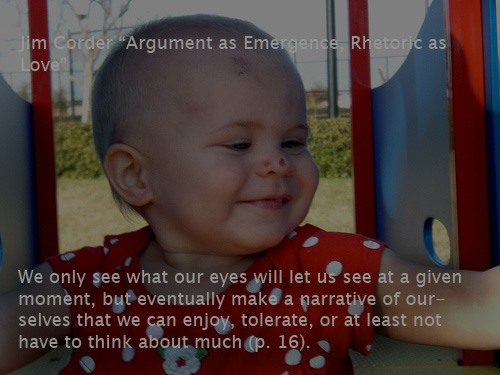
Rhetorical Support
I am advocating an approach to digital rhetoric not framed strictly as consciously directed, linear transference of episteme between two autonomous and fully formed subjects. Rather, I urge that we attend to how particular social media encounters, always affective and epistemic, contribute to and complicate subject formation and social relations. Living with others is hard work. There is no reason why it can't be hard scholarly work.
In Corder's terms, I am approaching rhetoric as a willingness to revise one's own orientation rather than as a preoccupation with manipulating an other's narrative. The former approach conjures monikers such as "persuasion, argument, and antagonism." The latter I would associate with terms such as preontological, ethical, and agonism.
In theorizing rhetorical support, I am looking to extend Corder's conscious disposition toward change into a theory of a kind of change that precedes consciousness. I am reading Corder's work through the phenomenological, metaphysical ethics of Emmanuel Levinas (1969) and Alphonso Lingis (1994). In short, Levinas's ethics stress our debt to alterity for the very formation of our existence; this debt charges us with an infinite responsibility for others. These intersubjective ethics are asymmetrical because I cannot assume that I construct the other as she constructs me—I always owe more than I have to give. The other changes me before a (conscious, thinking, responsive) "I" ever emerges on the scene to make any kind of "sense." Lingis works from this proposition to speak to the importance of "being-there" (as a saying entity) over the concern for the content of what might be said.
I am born from an irrecoverable affective engagement with others. That the relation is irrecoverable is why, like Burke's abyss, it potentially haunts me. Thus, Levinas asks us to attend to all others rather than to bury ourselves deeper into our symbol systems. In terms more familiar to rhetoric, to welcome them rather than persuade them (or, as Victor Vitanza might write, to ontologize, categorize, and hence "kNOw them"). I hope those familiar with D. Diane Davis' project for a "non-appropriative rhetoric" will see connections here since, like Davis, I am interested in tracking down a dimension of rhetoric not immediately reducible to meaning-making (Davis, 2005, pp. 191-192), or, in light of Vitanza, reducing others to categorical meanings.